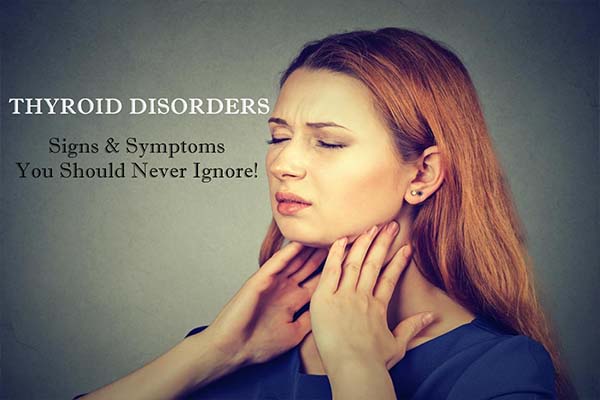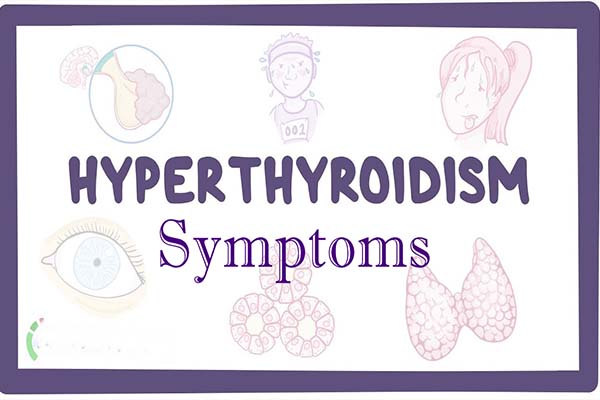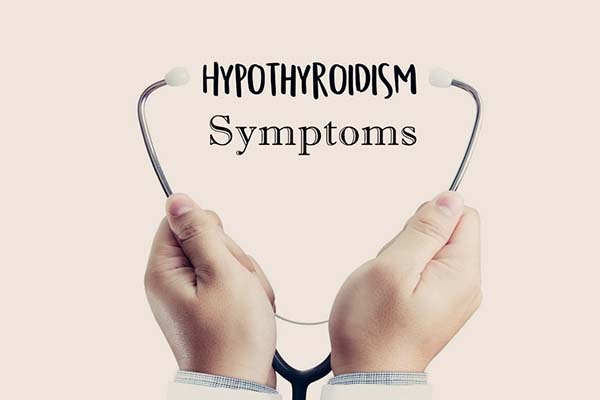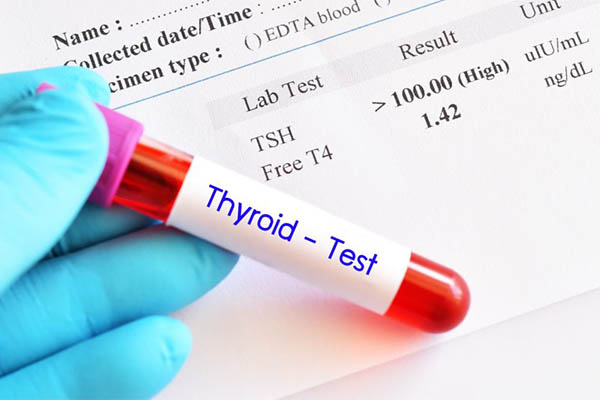Neglecting Thyroid Symptoms?

Thyroid Gland (TG) is responsible for the production of the thyroid hormone. The thyroid hormone helps to regulate our metabolism i.e. the conversion of calories into energy. Other functions of the thyroid gland include temperature control, hormones production, and body growth. Thyroid disorder can lead to the over-production or under-production of the thyroid hormone. When the thyroid gland is overactive, it produces an excessive amount of thyroid hormone to cause Hyperthyroidism.

When the thyroid gland is under-active, it produces an insufficient amount of thyroid hormone to cause Hypothyroidism. Both these conditions can further lead to various health problems like heart disorders & mental ailments. Also, thyroid symptoms are more commonly found in women than men
Thyroid Symptoms and causes
There are many different causes for the development of thyroid disorders.
- Too Much Iodine Intake
- Graves’ disease
- Pituitary Adenoma
- Medicinal Drugs (For Heart)
- Damaged or Removed Thyroid Tissue
- Presence of antibodies that restrict the production of Thyroid Hormone
- Toxic Multi-Nodular Goiter
- Acute Thyroiditis
- Congenital Disorders of Thyroid Gland
- Post-Partum Thyroiditis
Hyperthyroid symptoms

When your thyroid glands produce too much thyroid hormone, the condition is called Hyperthyroidism. Here are the most common symptoms of Hyperthyroidism.
- Body tremors – This refers to the unintentional or uncontrolled repetitive tightening of body muscles, leading to shaky movements in different body parts. Tremors are more common in arms, head, legs & vocal-cord area.
- Inability to tolerate heat – A person with hyperthyroid is intolerant to heat, which is why they tend to feel uneasy in hot surroundings.
- Rapid heart rate – When the heart rate per minute is quite higher than the normal rate i.e. more than 100bpm, it can be a sign of hyperthyroidism.
- Anxiousness – When a person experiences nervousness in every situation, it can point towards the hyperthyroidism.
- Excessive sweating – People suffering from this disorder tend to experience excessive sweating while doing physical tasks or at hotter places.
Inability to concentrate – If you face trouble in concentrating on certain tasks & things, then it might be a sign of this problem.
- Boosted bowel movement – When the bowel movement is at a higher rate than the usual, it can point towards a hyperthyroidism problem.
- Low energy – If you experience low energy at all times of the day, you might be suffering from this health issue.
- Involuntary loss of weight – If a person experiences weight loss without actually working out or changing diet, it can be a symptom of this problem too.
- Reduced blood flow during periods – Women suffering from this disorder tend to experience lower blood flow during periods.
- Increased size of the thyroid gland – If the size of thyroid gland increases & swelling appears around your lower neck area, it can be a clear sign of this problem.
- Thin skin – People suffering from this issue also experience skin thinning, which is an easily noticeable symptom.
Weak hair – Hair Thinning & Hair Fall can also be symptoms of hyperthyroidism.
- Increased hunger – If you are experiencing increased hunger than usual, then you might be suffering from the Hyperthyroidism problem.
- Breathing difficulty – Due to the swelling in the neck area, people suffering from this problem tend to experience breathing difficulties at various times.
Hypothyroid symptoms

When the thyroid gland doesn’t produce a sufficient amount of thyroid hormone, the condition is known as Hypothyroidism. This can further lead to a large number of other health problems. Here are the most common hypothyroidism thyroid symptoms of this condition.
- Tiredness & low energy – A person suffering from this condition tends to experience low energy and tiredness always. This makes it really difficult for them to work or do physical activities.
- Inability to tolerate cold – People who experience an inability to endure cold places more than others, might be a victim of this disorder.
- Pain in muscles – Constant muscle pain & cramps are two common symptoms of this problem.
- High cholesterol – If the levels of cholesterol are higher than the normal levels, it can be a clear symptom of hypothyroidism.
- Depression – Hypothyroidism can make you more sensitive to every situation and lead to depression as well.
Dry skin – If you are experiencing extra dry skin or rough lately, it may be because of Hypothyroidism.
- Goiter – Goiter is a condition in which the size of the thyroid gland increases more than its normal size. If a person is suffering from goiter, it might be due to the hypothyroidism problem.
- Pain in muscles & joints – If you have started to experience pain in your muscles and joints lately, it might also be a symptom of this disorder.
- Loss of appetite – People suffering from this disorder often tend to lose their normal appetite.
- Weight gain – If you have suddenly starting to gain weight or you are not able to lose weight, it is a sign of hypothyroidism.
- Swelling on face & eyes – Another symptom of Hypothyroidism is the sudden swelling of your face and eyes.
- Excessive bleeding during periods – Women suffering from hypothyroidism tends to experience excessive bleeding for a prolonged time during periods.
Slower thinking & memory loss – If a person is not able to think quickly or forgets everything quickly, it can be a symptom of this problem.
- Constipation – Constipation or inability to pass stool is one of the signs of hypothyroidism.
- Hair loss – Hair thinning and hair loss can both point towards the presence of this problem.
- Heavy voice – If you feel that your voice has become heavier than before, it might be due to this disorder.
Diagnosis

Hyperthyroidism & Hypothyroidism can both be diagnosed by a doctor by taking the sample of your blood for testing. The levels of thyroid hormones and TSH are analyzed from your blood sample. If the TSH levels are below normal, then a person is diagnosed with Hyperthyroidism. If the TSH levels are higher than normal, then a person is diagnosed with Hypothyroidism. To avoid the problem from becoming worse, you need to start with the treatment as soon as you’re diagnosed with thyroid problems.
Treatment of thyroid
There are various types of treatments available for thyroid disorders.
- Medicinal treatment
OTC (Over-The-Counter) medicines, Beta-Blockers & Anti-Thyroid drugs can help in the treatment of this problem. In severe cases, removal of the thyroid gland might be necessary.

Thyroid diet plan
Changes in your diet can help in keeping the thyroid problems under check. You can get in touch with a licensed dietician to build the best diet plan for you.

Regular exercise to fight thyroid problem
Physical exercises like walking, cycling, dancing, swimming, cardio, and aerobics, etc. can help in controlling and treating thyroid issues.

- Yoga can help you with thyroid symptoms
Yoga is one of the best ways to treat thyroid disorders. Various Asanas & Pranayamas like Boat Pose, Fish Pose, Camel Pose, Cobra Pose, etc. can help in treating thyroid problems.

The bottom line
So this was everything you need to know about thyroid disorders, their symptoms, and different treatments. Hypothyroidism & Hyperthyroidism are both serious health issues, which shouldn’t be neglected. Therefore, if you’re experiencing any of these symptoms, then you need to get your blood test done today.



